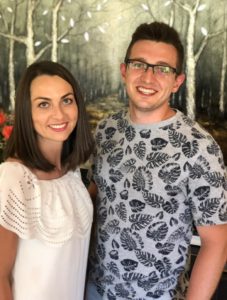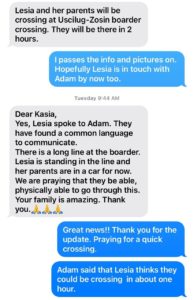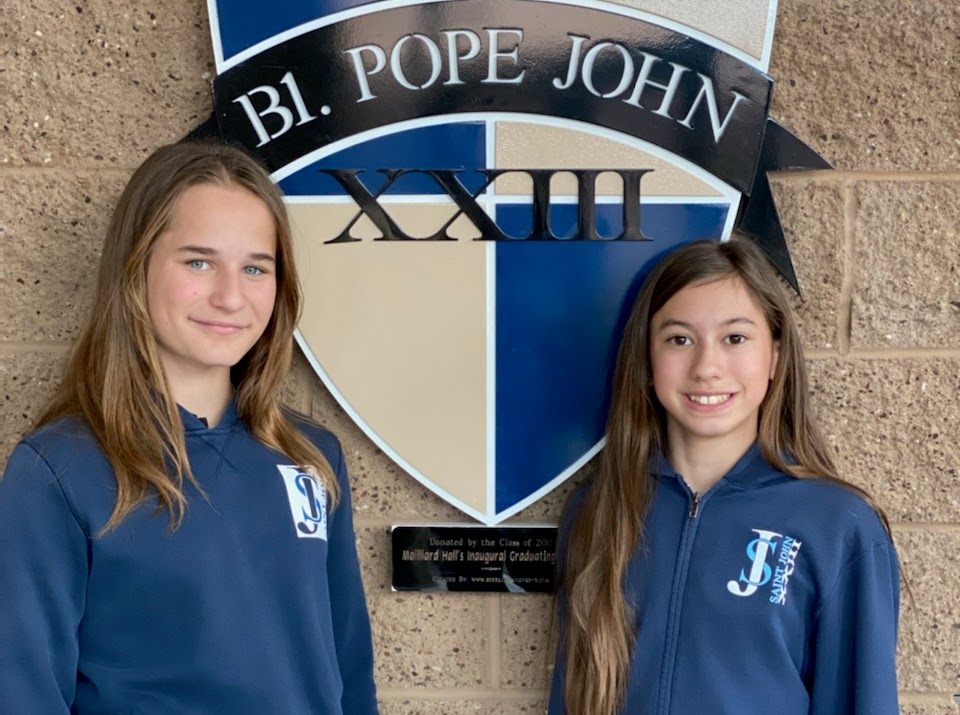By Joyce Coronel, The Catholic Sun
SCOTTSDALE – – The power of prayer plus the aid of technology united two families thousands of miles apart in an international rescue operation. And it was all at the instigation of two 12-year-old girls.
Sixth-grade students at St. John XXIII Catholic School in Scottsdale, Lexi Bastian and Zofia Pajic are classmates. When Lexi offered a heartfelt prayer that her relatives in Ukraine would manage to stay safe amid an escalating war and surging humanitarian crisis, Zofia was moved to speak to her Polish-born mother Kasia about it.

“We are friends. We communicate about homework and stuff but we’re not like buddy-buddies,” Kasia Pajic said of the Bastians. “We know each other and say hi to each other at pick-up but we were not friends on a very personal note I would say.”
That all changed when a text message landed in Kasia’s phone on a Sunday morning. It was Lexi’s mom, Dianna.
“Do you by any chance know of anyone in Poland who would be willing to rent out a flat somewhere for my family members once they cross the Polish border from Lviv, Ukraine? Maybe for three months or so?” the message read in part. The text went on to describe the declining health and limited mobility of Dianna’s aunt and uncle who are in their late 80s and their 50-year-old daughter who takes care of them. “They are so traumatized right now.”
Kasia, who was born in Poland and came to the U.S. with her parents when she was 7, called her mother, but to know avail. No one, it seemed, had any vacancies.
“Then, on a whim, I reached out to our cousin who lives in Poland,” Kasia said. She told him about the Ukrainian family seeking shelter.
Kasia and her Polish cousin used Facebook Messenger to communicate. “She wrote me back and said, ‘We do have a house. It’s in the countryside.’”


Ewelina found the house and Adam drove to the border to pick them up.
The two-bedroom house has a bathroom and kitchen. “It’s a small house in a small town. The only downside is a wood furnace, so they would just have to get up in the morning and fill it. Like a cabin, you know?” Kasia said.
But there was more. The Polish cousin inquired as to whether the Ukrainian family would need to be picked up from the border.
“I wasn’t going to ask,” Kasia said, adding that she didn’t dare ask for more favors. The cousin offered to see what she could arrange.
That’s when Dianna Bastian gave Kasia’s phone number to Andre, the elderly Ukrainian couple’s son who lives on the East Coast here in the U.S. and was frantically trying to help get his parents out of war-torn Ukraine.
By Tuesday morning, Andre called Kasia and told her his family would be on the border between Ukraine and Poland at 2 p.m. that day. Kasia called her cousins to alert them. It would be an 8- or 9-hour journey to the rendezvous point.


“The crossing can take two hours or two days,” Kasia said, but in this case, her Polish cousins waited about 3 or 4 hours.
“Nobody knew each other,” Kasia said. “I didn’t even know what Andre looked like.” They exchanged pictures of their relatives through text messaging so they would recognize each other at the crossing point.
“It was back and forth: ‘Here’s the person you’re picking up, this is person that picks you up.’”
By 10 p.m. that night, the three Ukrainians were able to cross the border and were greeted by Kasia’s Polish cousins. Upon meeting, they discovered they could communicate with each other in English.
“Now they’re in a safe place.”
Did they need any food, medicine, or supplies?” Kasia asked her Polish cousin, Adam. The family had fled for their lives with no time to pack a toothbrush or necessities.
“All he said was, ‘They just want to lay down and rest. They want to rest now that there are no sirens going off and there’s not a chance of somebody bombing the place.’”
Faith in Action
Dianna Bastian knows well the crushing hardships endured by refugees. She is a first-generation American of 100 percent Ukrainian heritage.
“My mom fled from the Russians back in 1949 with her sister and my grandma and grandpa. They pretty much went through the same thing: the terror, the shooting, the occupation of Ukraine by Russians,” she said. Her mother’s family walked untold miles all the way to Poland and then Germany before emigrating to the U.S.
Ukrainian was Dianna’s first language, and she grew up listening to the stories about the horrors of warfare. “Why are old people always talking about war?” she wondered.
She was in touch with her family members in Ukraine in January and asked them about the growing hostilities. “They were not really all that concerned. They didn’t think that this conflict would escalate to the point that it did, so they didn’t make any preparations to leave.
“Even to the last few days when we were trying to convince them to leave, they didn’t want to go.” But as the fighting around them intensified, with air raid sirens blaring and the shelling of neighborhoods mounting, they hastened to bomb shelters.
“They’re using the subways in Kyiv as bomb shelters. Everybody was sleeping down there on yoga mats, and they were sharing all their food and water.”
So how does it feel knowing that complete strangers were willing to drive for hours to the Ukrainian border to rescue people they didn’t even know?
“Prayer completely brought us together and it was through prayer that I thought, ‘I’m going to reach out to Kasia and tell her what’s happening and see if she can help,’” Dianna said. “She got on the horn right away and was able to facilitate this.”
It was a five or six-hour drive from where Kasia’s cousin lives to reach the Ukrainian border. “To be as gracious and loving and caring to drive pretty much from here to San Diego, that distance for someone you don’t know, to help them cross the border, and then drive them back to where you can provide them lodging, food, a clean place to stay without and bombs exploding, without any air raid sirens going off — I mean, it’s truly heartwarming.
“It’s such a faith-in-action story. Nobody told him he had to do it. He just took it on himself to go and get them.
“It’s amazing.”
Kasia, who grew up in a multigenerational household that included grandparents and two maternal aunts who survived the horrors of WWII, said that like Dianna, she often heard the stories of how family members had to run for their lives.
“I grew up listening to stories of war and escaping, so I felt the pain of that family,” Kasia said of Dianna’s relatives. Overcome by emotion, her voice wobbles. “I can only imagine my grandparents, how helpless would I feel if I was here in the States and there’s really nothing you can do.”
She said she thanked her Polish cousin Adam profusely for assisting the Ukrainians. “It was the right thing to do,” he told her.
“I think it’s important to also remember to ask for help even if the situation is helpless. Put your faith in God and let Jesus take the wheel,” Kasia said.
Preston Colao, principal of St. John XXIII where the Bastian and Pajic families connected, said the rescue effort was an example of how prayer changes things.
“It wouldn’t have happened in a public-school setting, and it really is a blessing for both those families,” Colao said. Since word got out about the two sixth-graders who together with their families helped three Ukrainian escape their war-torn homeland, parishioners at nearby St. Bernadette in Scottsdale have stepped forward to offer — or ask for — help.
“We’re starting to see it come out now, some others we could help out of this story of these two little girls,” Colao said.
Prayers for conversion
Fr. Andriy Chirovsky, a Ukrainian Catholic priest who lives in Flagstaff, said many people wonder if prayer is making a difference in the situation in Ukraine.
“I tell people, ‘Are you kidding me? What gives those grandmothers the gumption to stand up to the Russian army? The stories of courage, of standing in front of and kneeling in front of the tanks? Or the people who come out and they’re surrounded by Russian troops on all sides, and they stand there with their Ukrainian flags, and they say, ‘Go home! What are you doing here?’”
Fr. Chirovsky is also encouraging people to pray for Vladamir Putin’s conversion. “They’re angry and they say, ‘Let him go to hell,’ and I tell them, ‘No, we have to pray. God does not want the death of a sinner but that he should repent and live.’
“And imagine if he went through a conversion experience?” Putin, Fr. Chirovsky says, “plays a game of being a Russian Orthodox Christian but obviously actions speak louder than words.
“I like to tell this story. Who united Ukrainian minds? Stalin. Who united Ukrainian hearts? Putin. God makes all things work out to the good for those who love Him and even the evil works of these men inspired by completely evil intentions.”
“Amazing how three lives were spared all because of the prayer intention a little 12-year-old girl, my Lexi,” Dianna said. “Kasia’s family is truly salt of the earth. They willingly gave of themselves because they saw a need and heard a call for help from people they didn’t even know.
“That should be the knee-jerk reaction of every Catholic who witnesses human suffering. It is the perfect story of faith in action and I’m so glad our girls witnessed it firsthand.”






